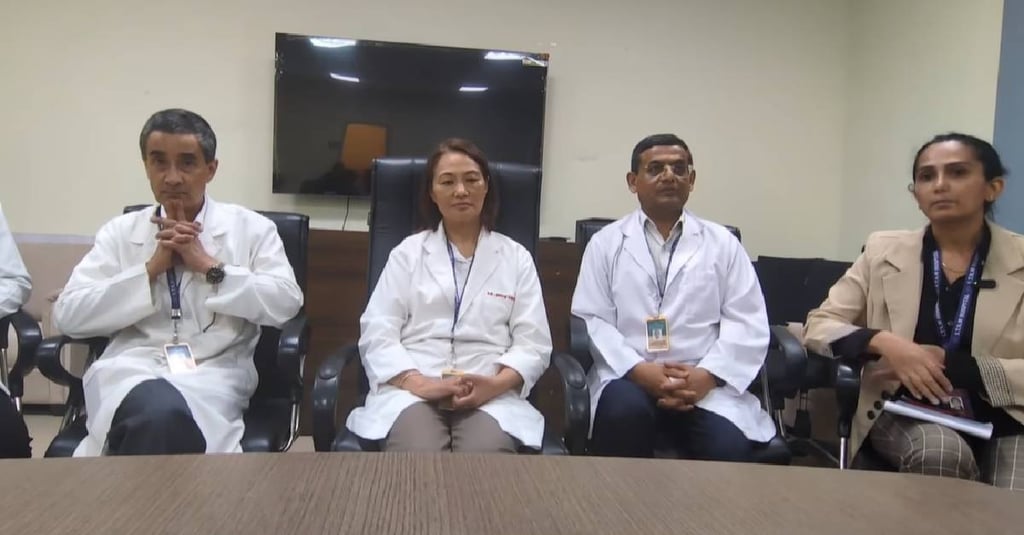STNM Hospital pioneers HIPEC Cancer treatment in Sikkim, a first for Northeast state-run hospitals
Dr. Nilima Pradhan, under whose supervision the operation was conducted, said, “This successful procedure is the result of rigorous training, dedication, and teamwork. We are proud that STNM Hospital can now offer this high-end cancer treatment as part of its oncology services.”
LOCAL


STNM Hospital in Gangtok has achieved a significant medical milestone by successfully conducting Sikkim’s first-ever HIPEC (Hyperthermic Intraperitoneal Chemotherapy) procedure. This pathbreaking achievement positions STNM Hospital as the first government-run hospital in North-East India to establish a comprehensive HIPEC program, offering new hope to patients battling advanced abdominal cancers.
The intricate procedure was performed on a patient suffering from advanced-stage ovarian cancer. The operation was led by Dr. Romey Rai, Consultant Gynae Oncosurgeon, with the expert guidance of Dr. Nilima Pradhan, Head of the Department, and Dr. Anita Gurung, Specialist in Anaesthesiology and Critical Care. The hospital’s nursing officers and OT technologists also played an essential role in the successful execution of the operation.
Hospital sources have confirmed that the patient, after undergoing the intensive procedure, has been discharged and is recovering steadily. The successful recovery highlights the effectiveness of the HIPEC approach and underscores the hospital’s growing capacity to handle complex cancer cases.
HIPEC is a highly specialized treatment used to target cancers that have spread within the abdominal cavity. The procedure involves two major steps: first, an extensive surgical operation called cytoreductive surgery, where visible tumors are removed from the abdomen. Then, heated chemotherapy drugs are circulated within the abdominal cavity for about 60 to 90 minutes. The heat increases the efficacy of the drugs, allowing them to penetrate deeper into tissues and destroy remaining microscopic cancer cells that might otherwise evade traditional treatments.
Unlike systemic chemotherapy, which affects the entire body and comes with significant side effects, HIPEC targets the affected area more precisely and with greater intensity. This localized treatment method not only increases the drug’s cancer-fighting ability but also reduces systemic toxicity. This dual advantage makes HIPEC a preferred option for treating cancers such as ovarian, gastric, colorectal, appendix, and peritoneal carcinomatosis.
Dr. Rai, who spearheaded the surgery, said, “HIPEC represents a paradigm shift in how we approach abdominal cancers. The success of this first case is proof that we now have the tools and expertise to provide cutting-edge oncological care right here in Sikkim.” He further added that more patients with advanced intra-abdominal cancers could benefit from this life-extending treatment.
For Sikkim, a small Himalayan state often perceived as lacking in super-specialty medical infrastructure, the introduction of HIPEC is a game-changer. It reduces the need for patients to travel to distant metros for advanced treatment, saving both time and resources for families already under emotional and financial stress.
Dr. Nilima Pradhan, under whose supervision the operation was conducted, said, “This successful procedure is the result of rigorous training, dedication, and teamwork. We are proud that STNM Hospital can now offer this high-end cancer treatment as part of its oncology services.”
The procedure required not only surgical precision but also a robust support system involving critical care, anesthesiology, nursing, and post-operative monitoring. Dr. Anita Gurung, who oversaw the anaesthesia and critical care aspects, said, “Managing HIPEC cases requires coordinated teamwork. It’s not just a surgery; it’s a holistic approach involving multiple departments working in sync.”
